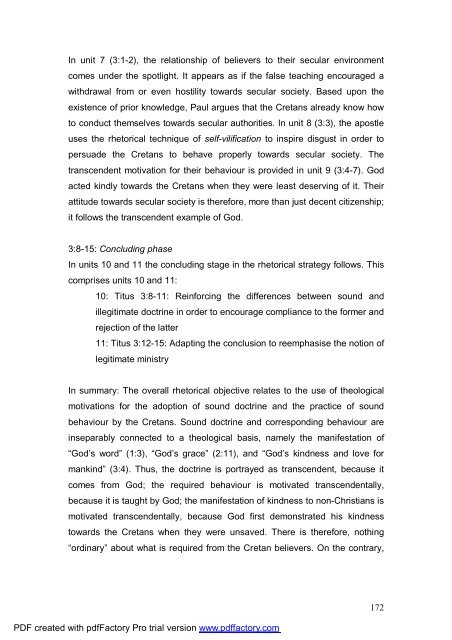A Text centred rhetorical analysis of Paul's Letter to Titus
A Text centred rhetorical analysis of Paul's Letter to Titus
A Text centred rhetorical analysis of Paul's Letter to Titus
Create successful ePaper yourself
Turn your PDF publications into a flip-book with our unique Google optimized e-Paper software.
In unit 7 (3:1-2), the relationship <strong>of</strong> believers <strong>to</strong> their secular environment<br />
comes under the spotlight. It appears as if the false teaching encouraged a<br />
withdrawal from or even hostility <strong>to</strong>wards secular society. Based upon the<br />
existence <strong>of</strong> prior knowledge, Paul argues that the Cretans already know how<br />
<strong>to</strong> conduct themselves <strong>to</strong>wards secular authorities. In unit 8 (3:3), the apostle<br />
uses the <strong>rhe<strong>to</strong>rical</strong> technique <strong>of</strong> self-vilification <strong>to</strong> inspire disgust in order <strong>to</strong><br />
persuade the Cretans <strong>to</strong> behave properly <strong>to</strong>wards secular society. The<br />
transcendent motivation for their behaviour is provided in unit 9 (3:4-7). God<br />
acted kindly <strong>to</strong>wards the Cretans when they were least deserving <strong>of</strong> it. Their<br />
attitude <strong>to</strong>wards secular society is therefore, more than just decent citizenship;<br />
it follows the transcendent example <strong>of</strong> God.<br />
3:8-15: Concluding phase<br />
In units 10 and 11 the concluding stage in the <strong>rhe<strong>to</strong>rical</strong> strategy follows. This<br />
comprises units 10 and 11:<br />
10: <strong>Titus</strong> 3:8-11: Reinforcing the differences between sound and<br />
illegitimate doctrine in order <strong>to</strong> encourage compliance <strong>to</strong> the former and<br />
rejection <strong>of</strong> the latter<br />
11: <strong>Titus</strong> 3:12-15: Adapting the conclusion <strong>to</strong> reemphasise the notion <strong>of</strong><br />
legitimate ministry<br />
In summary: The overall <strong>rhe<strong>to</strong>rical</strong> objective relates <strong>to</strong> the use <strong>of</strong> theological<br />
motivations for the adoption <strong>of</strong> sound doctrine and the practice <strong>of</strong> sound<br />
behaviour by the Cretans. Sound doctrine and corresponding behaviour are<br />
inseparably connected <strong>to</strong> a theological basis, namely the manifestation <strong>of</strong><br />
“God’s word” (1:3), “God’s grace” (2:11), and “God’s kindness and love for<br />
mankind” (3:4). Thus, the doctrine is portrayed as transcendent, because it<br />
comes from God; the required behaviour is motivated transcendentally,<br />
because it is taught by God; the manifestation <strong>of</strong> kindness <strong>to</strong> non-Christians is<br />
motivated transcendentally, because God first demonstrated his kindness<br />
<strong>to</strong>wards the Cretans when they were unsaved. There is therefore, nothing<br />
“ordinary” about what is required from the Cretan believers. On the contrary,<br />
PDF created with pdfFac<strong>to</strong>ry Pro trial version www.pdffac<strong>to</strong>ry.com<br />
172

















